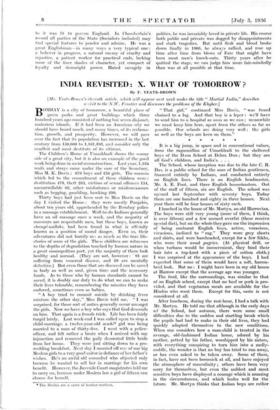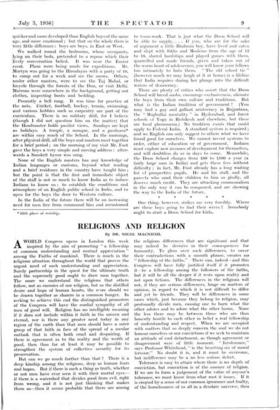INDIA REVISITED : X. WHAT OF TOMORROW ?
By F. YEATS-BROWN
[Mr. Yeats-Brown's eleventh article, which will appear next week under the title " Martial India," describes a visit to the N.W. Frontier and discusses the problems of the Khyber.] over the fact that its population has increased in the last * * * * • to the depths of degradation touched by human nature in their lives tolerable, remembering the miseries they have a great cosmopolitan port, yet the majority of them look healthy and normal. (They are not, however : 91 are suffering from venereal disease, and 29 are mentally defective.) But even those that are diseased can be saved endured, sometimes even as babies. 'which led to the commitment of these children were : adventures did not horrify 1112 as much as the true life- stories of some of the girls. These children are witnesses saved, it is doubly our duty to do what we can to make in body as well as soul, given time and the necessary funds. As to those who by human standards cannot be have an oil massage once a week, and the majority of masseurs are respectable men, but these boys, known as champi-wallahs, had been found in what is officially known as a position of moral danger. Even so, their about ten years old, apprehended by the Bombay police such as begging, gambling, hawking 210. day I visited the Home : they were mostly Punjabis, in a massage establishment. Well-to-do Indians generally destitution 473, theft 235, victims of sexual offences 154, uncontrollable 62, other misfortunes or misdemeanours waifs and strays came under the care of the Secretary, Miss M. K. Davis : 876 boys and 258 girls. The reasons side of a great city, but it is also an example of the good work being done in social reconstruction. Last year, 1,134 smallest and most destitute of its citizens. century from 150,000 to 1,161,383, and consider only the " A boy tried to commit suicide by drinking fever Thirty boys had just been sent to Miss Davis on the The Children's Home at -Umarkhadi shows the seamy • child-marriage: a twelve-year-old m9chi* girl was being quickly adapted themselves to the new conditions. married to a man of thirty-five. I went with a police- When one considers how a man-child is treated in the officer, and felt rather a brute when I arrived with my average, old-fashioned Indian home, adored by his injunction and removed the gaily decorated little bride mother, petted by his father, worshipped by his sisters, from her home. They were just sitting down to a pre- with everything conspiring to turn him into a molly- wedding breakfast. Next day I married off one of our big coddle, the wonder is that no boy has tried to run away, Moslem girls to a very good suitor in defiance of her father's or has even asked to be taken away. Some of them, wishes. He's an awful old scoundrel who objected only in fact, have not been homesick at all, and have enjoyed because he wanted to sell her in marriage for his own the atmosphere of masculinity ; others have been very benefit. However, the Juvenile Court magistrates told me sorry for themselves, but even the saddest and most to carry on, because under Moslem law a girl of fifteen can sensitive boys have displayed a courage which is amazing choose for herself. in the circumstances, and which bodes well for the BOMB AY is a city of tomorrow, a beautiful place of " That girl," continued Miss Davis, " was found green parks and great buildings which three chained to a log. And that boy is a leper : we'll have hundred years ago consisted of nothing but seven disjunct, to send him to a hospital as soon as we can ; meanwhile malarious islands. If it had been an American city we we must keep him here, apart from the others as far as should have heard much, and many times, of its reclama- possible. Our schools are doing very well : the girls tion, growth, and prosperity. However, we will pass as well as the boys are keen on them."
and shirts, and were bareheaded, except for a few. Sikhs, who wore their usual pugries. (At physical drill, or at Harrow except that the averageage was younger. of an English school, except that no beef or pork is pro- vided, and that vegetarian meals are available for the Hindus who want them. Except for this, caste is not of being sunburnt English boys, active, voracious, when turbans would be inconvenient, they bind their expected that some of them would have a soft, harem-. bred look. But no : I might have been in my old house special diet), but on the whole they gave me the impression vivacious, inclined to " rag." They wore grey shorts hair into a top-knot with a piece of cotton cloth.) I was surprised at the appearance of the boys. I had considered at all. The boys were still very young (none* of them, I think, is over fifteen) and a few seemed overfat (these receive there are one hundred and eighty in three houses. Next year there will be four houses of sixty each. Mr. A. E. Foot, and three English houseinasters. Out of the staff of fifteen, six are English. The school was opened last September with seventy boys. Today on English lines. There is an English headmaster, Das, is a public school for the sons of Indian gentlemen, all God's children, and India's. . . . financed entirely by Indians, and conducted entirely from the ragamuffins of Umarkhadi to the sheltered boys of the Doon School at Dehra Dun ; but they are The food, like the surroundings, was similar to that I lunched in the house of Mr. Martyn, an old Harrovian. The School, whose inception was due to the late C. R. It is a big jump, in space and in conventional values, mixture the other day," Miss Davis told me. . " I was After luncheon, during the rest-hour, I had a talk with surprised, for those sort of antics generally occur amongst Mr. Martyn. He told me that although in the early days the girls. Now we have a boy who says that God descends o f the School, last autumn, there were some small on him. That again is a female trick. Life has been fairly difficulties due to the sudden and startling break which' turgid lately. Last week-end I was called upon to stop a the pupils had had to make in their old lives, they had * The Mochis are a caste of reather-workers. future. Mr. Martyn thinks that Indian boys are rather quicker and more developed than English boys of the same age, and more emotional; but that on the whole there is Very little difference : boys are boys, in East or West.
We walked round the bedrooms, whose occupants, lying on their beds, pretended to a repose which their lively conversation belied. It was near the Easter exeat. Plans were being made for expeditions. Mr. Martyn was going to the Himalayas with a party of 10, to camp out for a week and see the snows. Others, under other masters, were to see the Taj Mahal, or bicycle through the forests of the Dun, or visit Delhi. Matrons were somewhere in the background, getting out clothes, inspecting boots and bedding.
Presently a bell rang. It was time for practice at the nets. Cricket, football, hockey, tennis, swimming, and various hobbies such as carpentry are part of the curriculum. There is no military drill, for I believe (though I did not question him on the matter) that the Headmaster holds pacifist views. Sundays are kept as holidays. A temple, a mosque, and a gurdwara* are within easy reach of the School. In the mornings, after physical drill, all the boys and masters meet together for a brief period ; on the morning of my visit Mr. Foot gave the boys a very simple and moving address : after- wards a Sanskrit hymn was sung..
None of the English masters has any knowledge of Indian languages or customs, beyond what reading and a brief residence in the country have taught him ; but the point is that the first and immediate object of the staff is not so much to know India as to induce Indians to know us : to establish the conditions and atmosphere of an English public school in India, and to open for the boys the door to Western culture.
In the India of the future there will be an increasing need for men free from communal bias and accustomed
* Sikh place of worship.
to team-work. That is just what the Doon School will be able to supply. . . . If you, who are for the sake of argument a little Brahmin boy, have lived and eaten and slept with Sikhs and Moslems from the age of 12 to 18, shared hardships and played games with them, quarrelled and made friends, given and taken out of the warm heart of adolescence, you will know your fellows too intimately to hate them. " The old school tie " (however much we may laugh at it at home) is a lifeline that India requires during her plunge into the difficult waters of democracy.
There are plenty of critics who assert that the Doon School will breed snobs, encourage exclusiveness, alienate the boys from their own culture and traditions. But what is the Indian tradition of government ? (You may find a gay and gallant aristocracy in Rajputana, the " Moghullai mentality " in Hyderabad, and forest schools of Yoga in Rishikesh and elsewhere, but these are local phenomena.) No tradition exists that could apply to Federal India. A standard system is required ; and we English can only suggest to others what we have found good for ourselves. We cannot invent systems to order, either of education or of government. Indians must explore new avenues of development for themselves, and will doubtless do so in days to come. Meanwhile, the Doon School charges from £80 to £100 a year (a fairly large sum in India) and gets these fees without difficulty ; in fact, Mr. Foot already has a long waiting list of prospective pupils. He and his staff, and the parei.ts who send. their children to him so gladly, all deserve much credit. They are attacking communalism in the only way it can be conquered, and are showing the way to the India of the future.
One thing, however, strikes me very forcibly. Where are these boys going to find their wives ? Somebody ought to start a Doon School for Girls.















































 Previous page
Previous page